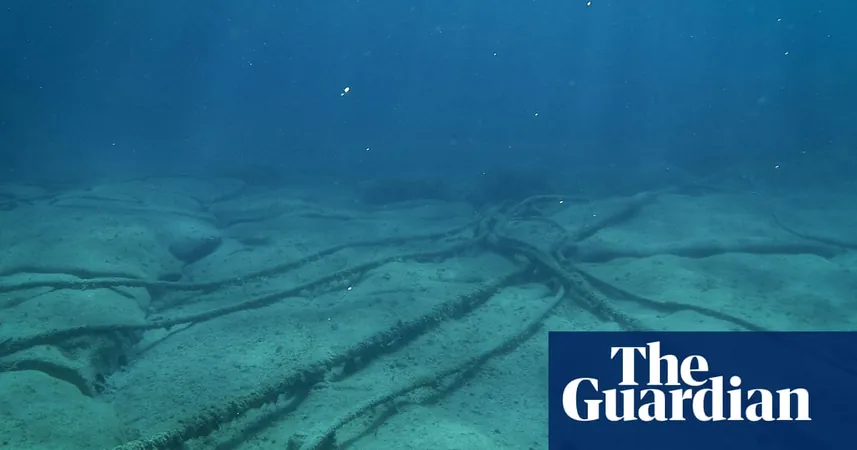
Undersea Data Cables Under Siege: The Geopolitical Tug-of-War Threatening Global Connectivity
2024-11-22
Author: Yan
Introduction
In a dramatic reminder of the fragility of global communication, recent events have exposed the vulnerability of undersea cables, essential conduits for nearly all international telecommunications. A striking historical parallel echoes from over a century ago when Lt. Cameron Winslow of the US Navy and his team cut a telegraphic cable off Cuba during the Spanish-American War, showcasing how vital these lines have always been in times of conflict.
Recent Incidents
Fast forward to November 17 and 18, 2023; two undersea fiber optic cables in the Baltic Sea were damaged, with German Defense Minister Boris Pistorius labeling the incident as likely sabotage. Attention has turned toward a Chinese cargo ship, the Yi Peng 3, which was in proximity to the damaged cables—highlighting how geopolitical tensions influence modern warfare tactics. The backdrop to these events includes the ongoing Russian invasion of Ukraine, aggressive posturing by China regarding Taiwan, and heightened tensions in the Israel-Gaza region.
The Importance of Undersea Cables
Undersea cables, robust and as thick as a garden hose, carry a staggering 99% of the world’s telecommunications traffic. With over 530 submarine cable systems spanning more than 850,000 miles, these cables facilitate trillions of dollars in daily financial transactions and enable sensitive government communications. Dr. Sidharth Kaushal, a senior research fellow at the Royal United Services Institute, warns, "The ramifications of sustained damage to these cables are quite significant."
Challenges of Disruption
The risks of disruption are heightened by the sheer number of cables deployed globally, making any single significant attack harder to trace. Yet, one-off attacks like those in the Baltic Sea, despite their plausible deniability, send strong diplomatic signals, further raising tensions in an already charged international climate.
Surveillance and Scrutiny
Curiously, the West has also been implicated in exploiting these cables for surveillance, as revealed by whistleblower Edward Snowden’s disclosures regarding the UK’s GCHQ. Simultaneously, a report from Recorded Future indicated that Russia has been actively mapping undersea cable systems, likely to prepare for potential sabotage—leaning into its strategy to retaliate against Western support for Ukraine.
Impact on Taiwan
Reports also suggest that not only Russia is under scrutiny; Taiwan's national audit office recently highlighted that foreign ships have damaged undersea cables linking the island to its outer territories 36 times since 2019, with 12 incidents occurring just last year. Notably, two cables linking Taiwan to its outlying Matsu Islands were severed within days by vessels traced back to China, creating a concerning precedent for an "invisible blockade” of Taiwan.
Non-State Actor Involvement
Even non-state actors have played their part; recently, Houthi rebels in Yemen denied involvement after significant damage to cables in the Red Sea. Each year, there are more than 100 cable faults reported, many occurring by accident—often the result of fishing nets or ships' anchors. However, experts like Howard Kidorf from Pioneer Consulting caution that cables can be severed relatively easily by those with malicious intent.
Economic Implications
The implications of cable damages extend beyond surveillance and military tactics. With repair costs soaring—around $40,000 a mile for submarine cables and between $200 million and $250 million for new transatlantic lines—the stakes in this complex geopolitical game are incredibly high. Notably, Chinese state-owned enterprises are increasingly seeking to expand their influence in the global submarine cable network, raising serious concerns about potential data manipulation and surveillance on a worldwide scale.
Conclusion
As international tensions simmer, analysts are left to ponder: how far will state actors go to disrupt these vital lifelines of global connectivity? The world watches with bated breath as the undersea battlefield becomes increasingly contested.


 Brasil (PT)
Brasil (PT)
 Canada (EN)
Canada (EN)
 Chile (ES)
Chile (ES)
 España (ES)
España (ES)
 France (FR)
France (FR)
 Hong Kong (EN)
Hong Kong (EN)
 Italia (IT)
Italia (IT)
 日本 (JA)
日本 (JA)
 Magyarország (HU)
Magyarország (HU)
 Norge (NO)
Norge (NO)
 Polska (PL)
Polska (PL)
 Schweiz (DE)
Schweiz (DE)
 Singapore (EN)
Singapore (EN)
 Sverige (SV)
Sverige (SV)
 Suomi (FI)
Suomi (FI)
 Türkiye (TR)
Türkiye (TR)